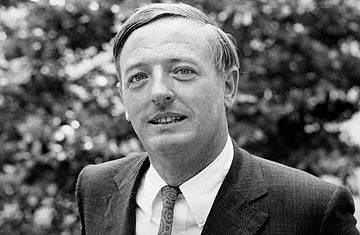
William F. Buckley, Jr. died Wednesday, February 27, 2008.
If being a conservative always led to a life like William F. Buckley Jr.'s, there would be no more liberals left. Who imagined that the life of the mind could be so damn fun? The mansions and yachts, the cocktails and champagne and cigars, the fabulous wife, the Who's Who of friends, the bottomless supply of anecdotes and witty ripostes, the nude swims at midnight to clear one's head for another glorious day tomorrow — and, somehow wedged in, enough career accomplishments for five large lives.
Buckley, who died Wednesday at 82, will merit his place on the front page of the New York Times because of his key role in the signal political phenomenon of late 20th-century America: the rise of conservatism. When he came on the scene nearly 60 years ago, the New Deal coalition was at its zenith and the Right was a disspirited collection of isolationists, Red-baiters, Babbitts and anti-Semites. The handsome young man with the accent polished at a British boarding school nominated himself chief spokesman for the conservative movement — a post that had been vacant since Wall Street crashed and Lindbergh fell for Hitler.
His father (an oilman) and father-in-law (gold, oil and timber) had been thoughtful enough to provide for a lifetime of high comfort. But Buckley leveraged his wealth with energy, passion and cheerful relentlessness. He wrote books laying out the conservative worldview, launched a magazine, National Review, to nurture and promote conservatism, and created one of the longest-running shows in public television history, Firing Line, to broadcast his views to millions — laying the groundwork for the countless pundits who dominate the airwaves today.
Along the way, Buckley made many things look easy — he dashed off bestselling spy novels, composed newspaper columns in spare half-hours, breezed through Bach on his harpsichord, even ran for mayor of New York City. The trickiest, and most important one, though was the way he glided from the intellectual to the conversational. He could translate the lofty ideas of Milton Friedman and Russell Kirk into table talk; he was a sort of jet-set Samuel Johnson, if only grumpy old Johnson had known the joys of Gstaad in ski season.
Certainly Buckley could get things completely wrong — including the very important issue of civil rights. But what made him formidable, even more than his energy and charm, was the number of things he got right. Buckley almost single-handedly drove anti-Semitism out of acceptable conservative thought. He championed Whittaker Chambers through the Alger Hiss affair. He was leery of Ayn Rand, Richard Nixon and the Iraq War. Most of all, he was a staunch anti-Communist. His brilliant, slashing speech in New York on the eve of Soviet premier Nikita Kruschev's 1960 visit to the United Nations foreshadowed by nearly a quarter-century the words of Ronald Reagan at the Berlin Wall. "Khrushchev cannot take permanent advantage of our temporary disadvantage, for it is the West he is fighting," Buckley assured a crowd at Carnegie Hall. "In the end, we will bury him."
If Reagan was the conservative messiah, as many gloomy Republicans seem to think this year, then Buckley was his John the Baptist, the voice in the wilderness preparing the way.
A dedicated sailor, Buckley knew he must steer by a fixed star, and his was the idea of human freedom. In the early 1980s, I organized a lecture series at the University of Denver, and Bill was one of our speakers. I remember an audience member asking him to name the person whose philosophy was most at odds with his own. I imagine we all expected to hear Stalin or Castro or Chomsky. "B.F. Skinner," Buckley answered instantly — the psychologist who argued that notions of freedom and human dignity were anachronisms in a scientific age.
That was the evening when I discovered, as thousands of others did, the kindness at the core of this celebrated intellectual combatant. He sat all evening with me chatting amiably without once making me feel ignorant, which I was. (I still cringe to remember that I tried to persuade him Steinbeck's Travels With Charley was a masterpiece.) I really believed I had the famous debater in a corner when I pointed out that giant corporations like Chrysler shouldn't denounce big government and then expect a bailout when they mismanage themselves into bankruptcy. Buckley gave me his familiar hop of the eyebrows and quick intake of breath, flashed the signature eye-twinkle and answered, "I think if Lee Iacocca were here with us, he would answer" — pause, grin — "[bleep] you."
A sure applause line in Barack Obama's speeches this year holds that "it's possible to disagree without being disagreeable." William F. Buckley proved that again and again.
